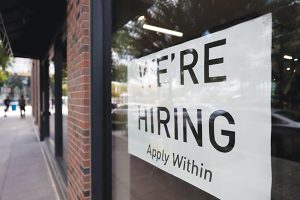The unexpected rise in US inflation is an opportunity to revisit an old debate, which is often a useful exercise. This current bout of inflation has its roots in mistaken assumptions made a decade ago.
After the 2008-2009 recession, the recovery in the labor market was notoriously slow. This was commonly blamed on the demand side; monetary and fiscal policy could have done more, it was said, to stimulate recovery. A less popular view — but one that looks correct in retrospect — is that both the demand and supply sides were at fault.
In particular, there were problems in the labor market: The US had a human capital deficit, with a lot of people simply not keen on returning to full-time, gainful employment in a prompt manner. The labor market recovery was so slow because both sides of the market were inadequate.
Fast forward to the pandemic and early 2021. It was the conventional wisdom that inflation would be very difficult to create, because demand is usually deficient and supply can respond to any surge in spending, thereby offsetting inflationary pressures. That was the consensus formed after the Great Recession, and it turned out to be spectacularly wrong. Now the US is living with its consequences, namely high inflation with a possible recession to follow.
The evidence is piling up that the US has been suffering from a deficit of human capital. For instance, a recent report showed that US life expectancy first stalled and then has been falling. In other words, current Americans — or at least some subset of them — are having trouble just staying alive.
And if a subset of current Americans is having trouble staying alive, then isn’t it plausible that, earlier in life, they had trouble finding and keeping work? That doesn’t follow as a matter of logic, but the two human capital deficits seem part of a broadly common social trend. If someone died in 2021 of opioid addiction, that same person may have been making some less-than-perfect employment decisions a decade earlier.
It doesn’t matter whether you blame the individual, as old-fashioned morality might do, or blame larger social forces, as is currently more fashionable. A subset of the US population seems off the track of making consistently good decisions.
A more controversial extension of this point would suggest that many Americans have been off the track of making good political decisions as well. You could make this charge of both the left and the right (and no, by citing both sides I am not suggesting there is moral equivalence). —Bloomberg
 The Gulf Time Newspaper One of the finest business newspapers in the UAE brought to you by our professional writers and editors.
The Gulf Time Newspaper One of the finest business newspapers in the UAE brought to you by our professional writers and editors.
